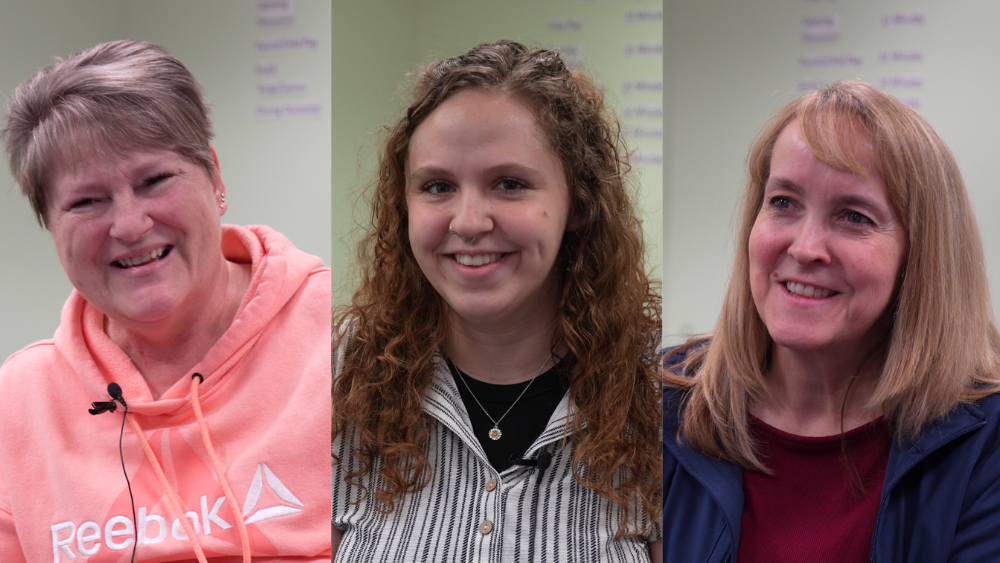Play: A Tool for Parents and their Children
March 29, 2024

Emma Speth, Kylee Hansen, and Marla Nef
The Institute for Disability Research, Policy & Practice’s Up to 3 program aims to help parents who have children under 3 with disabilities and delays. They implement evidence-based practices that can benefit all children, with or without delays. All parents may not realize how impactful connecting with their children through the use of play can be.
The Benefits of Play (BOP) initiative was created by Up to 3 with two goals in mind: first, to help parents "learn developmentally appropriate play that increases parent-child interactions and supports their child’s development in the areas of communication, problem-solving, self-regulation," and secondly to teach parents to "practice these strategies between class and share how they are working at class discussion" (2022-2023 Annual Report, pg 46).
BOP initiated a seven-week class that parents and children attend weekly to build connection between parents and their child. Emma Speth, an Up to 3 clinician, explained that some children do not have the cognitive abilities to know how to play or connect with their parents, and the parent in return may not know how to connect with their child with developmental delays. The BOP class helps create their bond through the use of play. "One of the main things we teach parents is to be face to face with their child, to follow their child's lead. What I mean by that is that whatever the child chooses to play with is what they start with. Then we teach the parents how to introduce different ways of playing with the same toy that the child has chosen. Then it goes into the parent choosing something and the child interacting with the parent."
BOP's classes have proven to be highly successful in correcting children's behavior and teaching parents techniques to bond with their children. Kate came in with her child, Noah, after having spent four relatively unsuccessful months with a behavior specialist in their home to "decrease tantrums and increase compliance to parent requests and directions" (pg 47). During the first class, Noah barely engaged with his mother despite her efforts to use the class' coaching strategies. Though this made her hesitant and skeptical, she agreed to keep coming to the classes. Kate slowly started incorporating techniques she learned in class into her home life, and Noah's tantrums also started to diminish. By the end of the class, "Kate and Noah were highly engaged during play periods, Kate looked comfortable following Noah’s lead and had decreased her demands during play. Noah had increased his time in play, frequently followed his mother’s model of new and novel play and had reduced his visible frustration/tantrums when his play choice was unavailable or transitions between activities were required." Through learning how to play, Kate grew closer to her child and Noah's behavior became more manageable.
BOP's classes have proven to be highly successful in correcting children's behavior and teaching parents techniques to bond with their children. Kate came in with her child, Noah, after having spent four relatively unsuccessful months with a behavior specialist in their home to "decrease tantrums and increase compliance to parent requests and directions" (pg 47). During the first class, Noah barely engaged with his mother despite her efforts to use the class' coaching strategies. Though this made her hesitant and skeptical, she agreed to keep coming to the classes. Kate slowly started incorporating techniques she learned in class into her home life, and Noah's tantrums also started to diminish. By the end of the class, "Kate and Noah were highly engaged during play periods, Kate looked comfortable following Noah’s lead and had decreased her demands during play. Noah had increased his time in play, frequently followed his mother’s model of new and novel play and had reduced his visible frustration/tantrums when his play choice was unavailable or transitions between activities were required." Through learning how to play, Kate grew closer to her child and Noah's behavior became more manageable.
Kylee Hansen, an Up to 3 behavior specialist, emphasized social-emotional skills as key to understanding a child's behavior. "Behavior has to do with social-emotional skills and the ability to interact with others. So when we have kids in here who struggle with their behavior, we're able to help them know how to interact better. That starts with how they interact with their parents and their peers. This class gives them a really good opportunity to practice those skills."
Parents taking an active role in a child's social-emotional growth is crucial for their development. "Social-emotional is not just a part of the child, it's really their lens and how they see the world," Marla Nef, Up to 3's program coordinator, said. "It's how they learn to interact with their parent from the beginning, it's how they learn to communicate what they need and when they're upset, and it's how the world interacts with them as well. So those relationships with their primary caregiver are just key to the rest of their lives, which I think can sometimes feel overwhelming. Parents [think], 'Oh I didn't do that all right,' but the good part is you don't have to do everything right to be a good parent. But knowing some of those things and to see what you can do, even a little bit at a time every day, can make a big difference for a child's social-emotional interaction."
To learn more about the Benefits of Play class and other services Up to 3 offers, please visit Up to 3. Children not enrolled in Up to 3 are also invited to attend Benefits of Play class.

